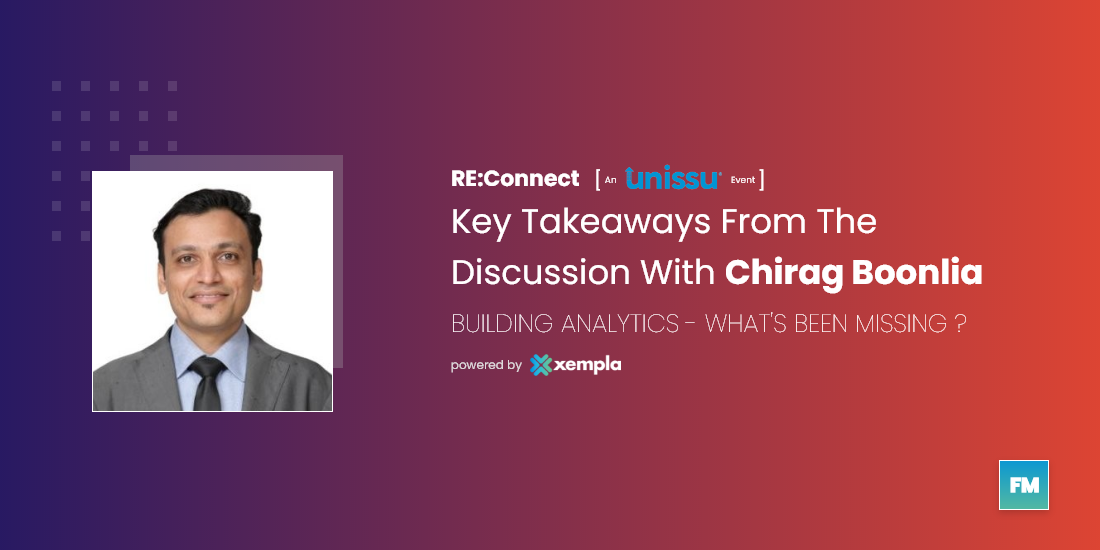We can definitely say that “Building Analytics” is one of the most loosely used words in the build environment or technology space. It is somehow losing its substance due to the repetitive usage of the word without fully knowing the implications. It’s not just affecting the real applications but also creating the wrong perception in the minds of clients. Then the cycle of false expectations starts there.
Building Analytics not only identifies past issues but also provides insights to overcome similar challenges and enhance resource efficiency. It provides a wide range of insights to descriptive, prescriptive and contextual ones. Despite all of these benefits, we rarely come across a facility that has fully leveraged its data resources and have delivered an effective solution for multiple use cases. What’s been missing? The right approach or the sufficient use cases?
So we took this opportunity to discuss this issue with the CTO of one of the leading property developers in India, who is known for his acute knowledge and candid personality.
Here are the takeaways from the discussion with Chirag Boonlia on finding the missing link in data analytics in the built environment.
Seamless Transition to Contactless Technology
In light of recent events, particularly the COVID-19 pandemic, there has been a remarkable shift towards contactless technology in the realm of Building Analytics. Chirag Boonlia emphasized that although COVID-19 has accelerated tech adoption, the focus should not solely be on improving infrastructure.
The pandemic did bring about positive changes in communication and remote working practices, leading to unified communication and reduced travel and unnecessary meetings.
Operational Efficiency: A Vital Transformation Aspect
When most people talk about technology in the CRE sector they probably discuss the part that is customer or client facing such as space management, workplace management, or improving the occupant’s experience. According to Chirag, you cannot do the transformation just for the outer world and ignoring the hard services.
He wanted to unfold the less spoken and less glamorous part of the CRE which is operations and maintenance where the main part of the savings comes from.
Operational efficiency is very important to cater to the seamless experience to the tenants so it has to be a hand and glove relationship between them. So if the vendor ecosystem or the employees do not maintain the expected work efficiency of the assets then it will ultimately cause trouble to the tenants.
After working with proprietary BMS solution and overall FM data architecture, Chirag wanted to build a cohesive integrated solution for the facility management platform. Then move to the sustainability, energy management, and space management modules which can be built-in on the top of the data infrastructure.
The Journey from Data to Wisdom
When asked that the building analytics as a term has been there for quite some time but the adoption rate is still low. According to Chirag, analytics as a term has almost become baseless in recent time due to it’s overuse everywhere. If we have to identify what’s missing in the current proposition is the accountability and the responsibility of tech vendors.
He continued by saying, “The first and foremost part of the solution is that you must invest in data acquisition. You should have quality data at the required frequency. Then put the context around it and convert it into information, convert that information into a knowledge base, and feed it to your design and building activities and then use that as wisdom for making the roadmap. This entire journey is not followed clearly.”
For the vendor or partner ecosystem, you should be able to put your skin in the game. If you are confident about the saving then make it on paper. That accountability and responsibility are missing.
Agility and Nimbleness of Startups
As the discussion moved from the technology to the tech providers, Chirag mentioned that he is always excited to work with startups because of the agility and the nimbleness they provide. He also highlighted the fact that they bring in non-bureaucratic solutions and co-create those solutions with your R&D which is a very unique and value-driven approach.
On the closing note, Chirag stated that his team is working with 30+ startups currently and his doors are always open for innovative ideas that can bring him savings.
It is necessary to steer away from the superficial use of the term “Building Analytics” and instead focus on the complete journey from data to wisdom. Operational efficiency and seamless technology adoption are crucial factors that should not be overlooked in Building Analytics. Collaboration with startups can also provide innovative solutions and achieve cost reductions in the built environment. By implementing these ideas, organizations can bridge the gap in Building Analytics and open up new opportunities for growth.
We hope that you have found these takeaways insightful and practical in nature. Is your organization using a building analytics software yet? If your team wants to fill the missing link in the building analytics and wants to know where to start? Then Schedule a call with Umesh Bhutoria (Founder, CEO Xempla) to learn more about it.

Leave a Reply